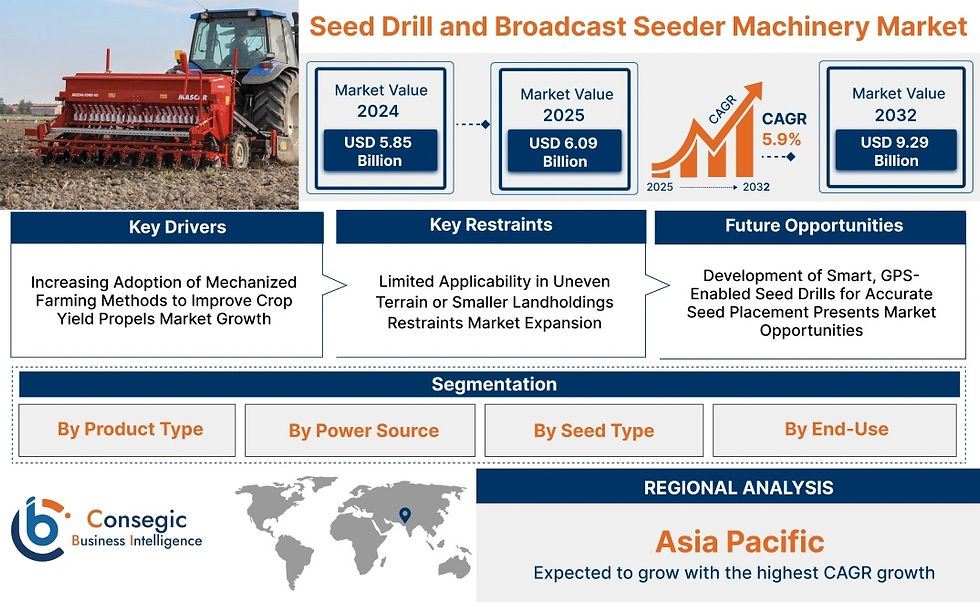Smart Workplace Market Size and Segmentation Overview
- Anurag ConsengicBusinessIntelligence
- Dec 26, 2024
- 3 min read
Smart Workplace Market Overview
The Smart Workplace market encompasses the integration of advanced technologies like IoT, AI, and cloud computing to create more efficient, productive, and employee-centric work environments. This involves implementing smart solutions across various aspects of the workplace, including building automation, workplace management systems, employee experience platforms, and workplace analytics. The market is driven by the growing need for businesses to enhance employee productivity, improve operational efficiency, and foster a more collaborative and engaging work environment.
Smart Workplace Market Drivers
Several factors contribute to the significant growth of the Smart Workplace market:
Increased Focus on Employee Experience: Organizations are increasingly prioritizing employee experience to attract and retain top talent. Smart workplaces enhance employee satisfaction and well-being through features like flexible workspaces, improved ergonomics, and access to amenities.
Rise of Remote and Hybrid Work Models: The growing popularity of remote and hybrid work models necessitates the adoption of smart workplace technologies to ensure seamless communication, collaboration, and productivity across distributed teams.
Advancements in Technology: Continuous advancements in IoT, AI, and cloud computing are enabling the development of more sophisticated and integrated smart workplace solutions.
Growing Demand for Data-Driven Decision Making: Smart workplaces generate a wealth of data that can be analyzed to optimize space utilization, improve energy efficiency, and enhance employee productivity.
Smart Workplace Market Restraints
Certain factors can hinder the growth of the Smart Workplace market:
High Initial Investment Costs: Implementing smart workplace solutions can involve significant upfront investments in hardware, software, and integration services.
Data Security and Privacy Concerns: Concerns related to data security and employee privacy can impede the adoption of technologies that collect and analyze employee data.
Resistance to Change: Resistance to change among employees and management can hinder the successful implementation and adoption of new technologies.
Lack of Skilled Workforce: A shortage of skilled professionals with expertise in smart building technologies and data analytics can limit the effective deployment and management of smart workplaces.
Smart Workplace Market Opportunities
The Smart Workplace market presents several promising opportunities for growth:
Integration with Emerging Technologies: Integrating smart workplace solutions with emerging technologies like augmented reality (AR), virtual reality (VR), and blockchain can unlock new possibilities for employee collaboration, training, and engagement.
Expansion of Smart Workplace Solutions: Expanding the scope of smart workplace solutions to include areas such as employee well-being, mental health, and social interaction can enhance the overall employee experience.
Development of AI-Powered Solutions: Leveraging AI and machine learning to optimize workplace operations, personalize employee experiences, and predict future needs can drive significant value.
Focus on Sustainability: Integrating sustainability features, such as energy-efficient building systems and waste reduction initiatives, can enhance the environmental impact of smart workplaces.
Smart Workplace Market Key Players
Schneider Electric (France), NTT Ltd. (Japan), Andorix (Canada), SEIDOR (USA), VertexPlus Technologies Limited (Asia Pacific), CANCOM Austria AG (Austria), Betacom S.A. (Europe), Aviniti (Europe), Atos SE (France), Microsoft (USA)
Smart Workplace Market Segmentation
By Component: Hardware, Software Service
By Product: IT Facility, Smart Lighting, HVAC System, Security System, Energy management, Others
By Deployment: On-Premise, Cloud
By Enterprise Size: Small & Medium Enterprise, Large Enterprise
By End-User: Healthcare, BFSI, Government, Manufacturing,IT & Telecommunication, Consumer Goods & Retail, Others
Smart Workplace Market Regional Analysis
Asia-Pacific, Europe, North America, Latin America, Middle East & Africa
Smart Workplace Market Recent Developments
Recent developments in the Smart Workplace market include:
Increased focus on employee well-being: Companies are increasingly incorporating employee well-being initiatives into their smart workplace strategies, such as providing access to wellness programs, promoting healthy lifestyles, and creating more ergonomic workspaces.
Rise of the "work from anywhere" model: The pandemic has accelerated the shift towards remote and hybrid work models, driving the demand for smart workplace solutions that support distributed teams and enhance collaboration across distances.
Integration with AI and machine learning: Companies are leveraging AI and machine learning to optimize workplace operations, personalize employee experiences, and gain valuable insights into workplace trends.
Focus on sustainability: There is a growing emphasis on sustainability in smart workplace solutions, with companies incorporating features such as energy-efficient building systems, waste reduction initiatives, and the use of renewable energy sources.
Contact us:
Contact no: (US) (505) 715-4344
Other Related Reports:



Comments